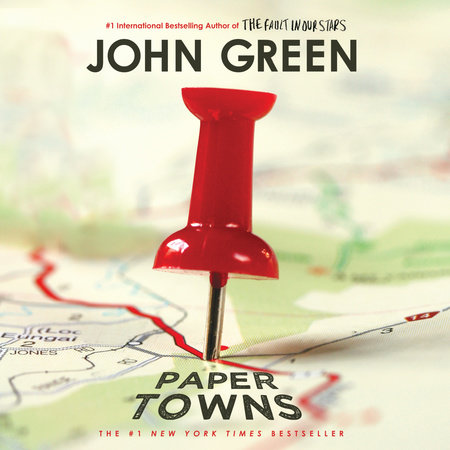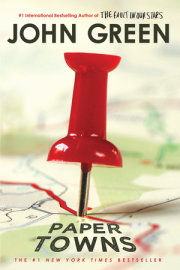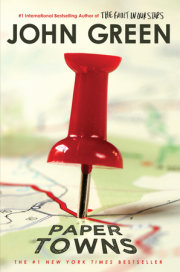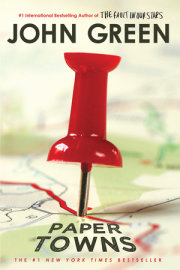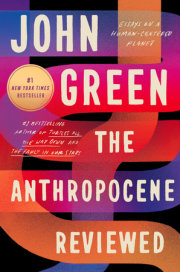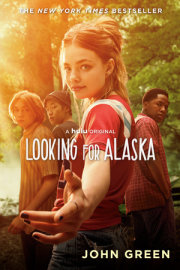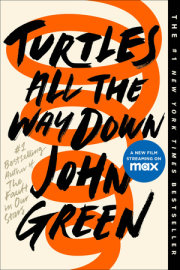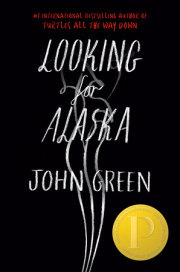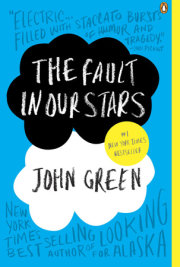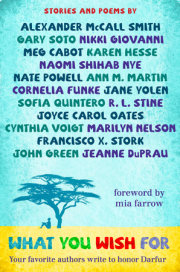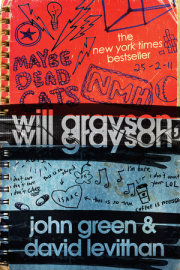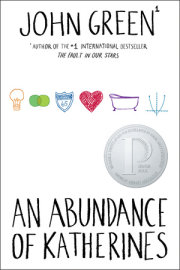PROLOGUE
The way I figure it, everyone gets a miracle. Like, I will probably never be struck by lightning, or win a Nobel Prize, or become the dictator of a small nation in the Pacific Islands, or contract terminal ear cancer, or spontaneously combust. But if you consider all the unlikely things together, at least one of them will probably happen to each of us. I could have seen it rain frogs. I could have stepped foot on Mars. I could have been eaten by a whale. I could have married the queen of England or survived months at sea. But my miracle was different. My miracle was this: out of all the houses in all the subdivisions in all of Florida, I ended up living next door to Margo Roth Spiegelman.
Our subdivision, Jefferson Park, used to be a navy base. But then the navy didn’t need it anymore, so it returned the land to the citizens of Orlando, Florida, who decided to build a massive subdivision, because that’s what Florida does with land. My parents and Margo’s parents ended up moving next door to one another just after the first houses were built. Margo and I were two.
Before Jefferson Park was a Pleasantville, and before it was a navy base, it belonged to an actual Jefferson, this guy Dr. Jefferson Jefferson. Dr. Jefferson Jefferson has a school named after him in Orlando and also a large charitable foundation, but the fascinating and unbelievable-but-true thing about Dr. Jefferson Jefferson is that he was not a doctor of any kind. He was just an orange juice salesman named Jefferson Jefferson. When he became rich and powerful, he went to court, made “Jefferson” his middle name, and then changed his first name to “Dr.” Capital D. Lowercase r. Period.
So Margo and I were nine. Our parents were friends, so we would sometimes play together, biking past the cul-de-sacced streets to Jefferson Park itself, the hub of our subdivision’s wheel.
I always got very nervous whenever I heard that Margo was about to show up, on account of how she was the most fantastically gorgeous creature that God had ever created. On the morning in question, she wore white shorts and a pink T-shirt that featured a green dragon breathing a fire of orange glitter. It is difficult to explain how awesome I found this T-shirt at the time.
Margo, as always, biked standing up, her arms locked as she leaned above the handlebars, her purple sneakers a circuitous blur. It was a steam-hot day in March. The sky was clear, but the air tasted acidic, like it might storm later.
At the time, I fancied myself an inventor, and after we locked up our bikes and began the short walk across the park to the playground, I told Margo about an idea I had for an invention called the Ringolator. The Ringolator was a gigantic cannon that would shoot big, colored rocks into a very low orbit, giving Earth the same sort of rings that Saturn has. (I still think this would be a fine idea, but it turns out that building a cannon that can shoot boulders into a low orbit is fairly complicated.)
I’d been in this park so many times before that it was mapped in my mind, so we were only a few steps inside when I began to sense that the world was out of order, even though I couldn’t immediately figure out what was different.
“Quentin,” Margo said quietly, calmly.
She was pointing. And then I realized what was different.
There was a live oak a few feet ahead of us. Thick and gnarled and ancient-looking. That was not new. The playground on our right. Not new, either. But now, a guy wearing a gray suit, slumped against the trunk of the oak tree. Not moving. This was new. He was encircled by blood; a half-dried fountain of it poured out of his mouth. The mouth open in a way that mouths generally shouldn’t be. Flies at rest on his pale forehead.
“He’s dead,” Margo said, as if I couldn’t tell.
I took two small steps backward. I remember thinking that if I made any sudden movements, he might wake up and attack me. Maybe he was a zombie. I knew zombies weren’t real, but he sure looked like a potential zombie.
As I took those two steps back, Margo took two equally small and quiet steps forward. “His eyes are open,” she said.
“Wegottagohome,” I said.
“I thought you closed your eyes when you died,” she said.
“Margowegottagohomeandtell.”
She took another step. She was close enough now to reach out and touch his foot. “What do you think happened to him?” she asked. “Maybe it was drugs or something.”
I didn’t want to leave Margo alone with the dead guy who might be an attack zombie, but I also didn’t care to stand around and chat about the circumstances of his demise. I gathered my courage and stepped forward to take her hand. “Margowegottagorightnow!”
“Okay, yeah,” she said. We ran to our bikes, my stomach churning with something that felt exactly like excitement, but wasn’t. We got on our bikes and I let her go in front of me because I was crying and didn’t want her to see. I could see blood on the soles of her purple sneakers. His blood. The dead guy blood.
And then we were back home in our separate houses. My parents called 911, and I heard the sirens in the distance and asked to see the fire trucks, but my mom said no. Then I took a nap.
Both my parents are therapists, which means that I am really goddamned well adjusted. So when I woke up, I had a long conversation with my mom about the cycle of life, and how death is part of life, but not a part of life I needed to be particularly concerned about at the age of nine, and I felt better. Honestly, I never worried about it much. Which is saying something, because I can do some worrying.
Here’s the thing: I found a dead guy. Little, adorable nine-year-old me and my even littler and more adorable playdate found a guy with blood pouring out of his mouth, and that blood was on her little, adorable sneakers as we biked home. It’s all very dramatic and everything, but so what? I didn’t know the guy. People I don’t know die all the damned time. If I had a nervous breakdown every time something awful happened in the world, I’d be crazier than a shithouse rat.
That night, I went into my room at nine o’clock to go to bed, because nine o’clock was my bedtime. My mom tucked me in, told me she loved me, and I said, “See you tomorrow,” and she said, “See you tomorrow,” and then she turned out the lights and closed the door almost-all-the-way.
As I turned on my side, I saw Margo Roth Spiegelman standing outside my window, her face almost pressed against the screen. I got up and opened the window, but the screen stayed between us, pixelating her.
“I did an investigation,” she said quite seriously. Even up close the screen broke her face apart, but I could tell that she was holding a little notebook and a pencil with teeth marks around the eraser. She glanced down at her notes. “Mrs. Feldman from over on Jefferson Court said his name was Robert Joyner. She told me he lived on Jefferson Road in one of those condos on top of the grocery store, so I went over there and there were a bunch of policemen, and one of them asked if I worked at the school paper, and I said our school didn’t have a paper, and he said as long as I wasn’t a journalist he would answer my questions. He said Robert Joyner was thirty-six years old. A lawyer. They wouldn’t let me in the apartment, but a lady named Juanita Alvarez lives next door to him, and I got into her apartment by asking if I could borrow a cup of sugar, and then she said that Robert Joyner had killed himself with a gun. And then I asked why, and then she told me that he was getting a divorce and was sad about it.”
She stopped then, and I just looked at her, her face gray and moonlit and split into a thousand little pieces by the weave of the window screen. Her wide, round eyes flitted back and forth from her notebook to me. “Lots of people get divorces and don’t kill themselves,” I said.
“I know,” she said, excitement in her voice. “That’s what I told Juanita Alvarez. And then she said . . .” Margo flipped the notebook page. “She said that Mr. Joyner was troubled. And then I asked what that meant, and then she told me that we should just pray for him and that I needed to take the sugar to my mom, and I said forget the sugar and left.”
I said nothing again. I just wanted her to keep talking—that small voice tense with the excitement of almost knowing things, making me feel like something important was happening to me.
“I think I maybe know why,” she finally said.
“Why?”
“Maybe all the strings inside him broke,” she said.
While I tried to think of something to say in answer to that, I reached forward and pressed the lock on the screen between us, dislodging it from the window. I placed the screen on the floor, but she didn’t give me a chance to speak. Before I could sit back down, she just raised her face up toward me and whispered, “Shut the window.” So I did. I thought she would leave, but she just stood there, watching me. I waved at her and smiled, but her eyes seemed fixed on something behind me, something monstrous that had already drained the blood from her face, and I felt too afraid to turn around to see. But there was nothing behind me, of course—except maybe the dead guy.
I stopped waving. My head was level with hers as we stared at each other from opposite sides of the glass. I don’t remember how it ended—if I went to bed or she did. In my memory, it doesn’t end. We just stay there, looking at each other, forever.
Margo always loved mysteries. And in everything that came afterward, I could never stop thinking that maybe she loved mysteries so much that she became one.
PART ONE
The Strings
1.
The longest day of my life began tardily. I woke up late, took too long in the shower, and ended up having to enjoy my breakfast in the passenger seat of my mom’s minivan at 7:17 that Wednesday morning.
I usually got a ride to school with my best friend, Ben Starling, but Ben had gone to school on time, making him useless to me. “On time” for us was thirty minutes before school actually started, because the half hour before the first bell was the highlight of our social calendars: standing outside the side door that led into the band room and just talking. Most of my friends were in band, and most of my free time during school was spent within twenty feet of the band room. But I was not in the band, because I suffer from the kind of tone deafness that is generally associated with actual deafness. I was going to be twenty minutes late, which technically meant that I’d still be ten minutes early for school itself.
As she drove, Mom was asking me about classes and finals and prom.
“I don’t believe in prom,” I reminded her as she rounded a corner. I expertly angled my raisin bran to accommodate the g-forces. I’d done this before.
“Well, there’s no harm in just going with a friend. I’m sure you could ask Cassie Hiney.” And I could have asked Cassie Hiney, who was actually perfectly nice and pleasant and cute, despite having a fantastically unfortunate last name.
“It’s not just that I don’t like prom. I also don’t like people who like prom,” I explained, although this was, in point of fact, untrue. Ben was absolutely gaga over the idea of going.
Mom turned into school, and I held the mostly empty bowl with both hands as we drove over a speed bump. I glanced over at the senior parking lot. Margo Roth Spiegelman’s silver Honda was parked in its usual spot. Mom pulled the minivan into a cul-de-sac outside the band room and kissed me on the cheek. I could see Ben and my other friends standing in a semicircle.
I walked up to them, and the half circle effortlessly expanded to include me. They were talking about my ex-girlfriend Suzie Chung, who played cello and was apparently creating quite a stir by dating a baseball player named Taddy Mac. Whether this was his given name, I did not know. But at any rate, Suzie had decided to go to prom with Taddy Mac. Another casualty.
“Bro,” said Ben, standing across from me. He nodded his head and turned around. I followed him out of the circle and through the door. A small, olive-skinned creature who had hit puberty but never hit it very hard, Ben had been my best friend since fifth grade, when we both finally owned up to the fact that neither of us was likely to attract anyone else as a best friend. Plus, he tried hard, and I liked that—most of the time.
“How ya doin’?” I asked. We were safely inside, everyone else’s conversations making ours inaudible.
“Radar is going to prom,” he said morosely. Radar was our other best friend. We called him Radar because he looked like a little bespectacled guy called Radar on this old TV show M*A*S*H, except 1. The TV Radar wasn’t black, and 2. At some point after the nicknaming, our Radar grew about six inches and started wearing contacts, so I suppose that 3. He actually didn’t look like the guy on M*A*S*H at all, but 4. With three and a half weeks left of high school, we weren’t very well going to renickname him.
“That girl Angela?” I asked. Radar never told us anything about his love life, but this did not dissuade us from frequent speculation.
Ben nodded, and then said, “You know my big plan to ask a freshbunny to prom because they’re the only girls who don’t know the Bloody Ben story?” I nodded.
“Well,” Ben said, “this morning some darling little ninth-grade honeybunny came up to me and asked me if I was Bloody Ben, and I began to explain that it was a kidney infection, and she giggled and ran away. So that’s out.”
In tenth grade, Ben was hospitalized for a kidney infection, but Becca Arrington, Margo’s best friend, started a rumor that the real reason he had blood in his urine was due to chronic masturbation. Despite its medical implausibility, this story had haunted Ben ever since. “That sucks,” I said.
Ben started outlining plans for finding a date, but I was only half listening, because through the thickening mass of humanity crowding the hallway, I could see Margo Roth Spiegelman. She was next to her locker, standing beside her boyfriend, Jase. She wore a white skirt to her knees and a blue print top. I could see her collarbone. She was laughing at something hysterical—her shoulders bent forward, her big eyes crinkling at their corners, her mouth open wide. But it didn’t seem to be anything Jase had said, because she was looking away from him, across the hallway to a bank of lockers. I followed her eyes and saw Becca Arrington draped all over some baseball player like she was an ornament and he a Christmas tree. I smiled at Margo, even though I knew she couldn’t see me.
“Bro, you should just hit that. Forget about Jase. God, that is one candy-coated honeybunny.” As we walked, I kept taking glances at her through the crowd, quick snapshots: a photographic series entitled Perfection Stands Still While Mortals Walk Past. As I got closer, I thought maybe she wasn’t laughing after all. Maybe she’d received a surprise or a gift or something. She couldn’t seem to close her mouth.
“Yeah,” I said to Ben, still not listening, still trying to see as much of her as I could without being too obvious. It wasn’t even that she was so pretty. She was just so awesome, and in the literal sense. And then we were too far past her, too many people walking between her and me, and I never even got close enough to hear her speak or understand whatever the hilarious surprise had been. Ben shook his head, because he had seen me see her a thousand times, and he was used to it.
“Honestly, she’s hot, but she’s not that hot. You know who’s seriously hot?”
“Who?” I asked.
“Lacey,” he said, who was Margo’s other best friend. “Also your mom. Bro, I saw your mom kiss you on the cheek this morning, and forgive me, but I swear to God I was like, man, I wish I was Q. And also, I wish my cheeks had penises.” I elbowed him in the ribs, but I was still thinking about Margo, because she was the only legend who lived next door to me. Margo Roth Spiegelman, whose six-syllable name was often spoken in its entirety with a kind of quiet reverence. Margo Roth Spiegelman, whose stories of epic adventures would blow through school like a summer storm: an old guy living in a broken-down house in Hot Coffee, Mississippi, taught Margo how to play the guitar. Margo Roth Spiegelman, who spent three days traveling with the circus—they thought she had potential on the trapeze. Margo Roth Spiegelman, who drank a cup of herbal tea with The Mallionaires backstage after a concert in St. Louis while they drank whiskey. Margo Roth Spiegelman, who got into that concert by telling the bouncer she was the bassist’s girlfriend, and didn’t they recognize her, and come on guys seriously, my name is Margo Roth Spiegelman and if you go back there and ask the bassist to take one look at me, he will tell you that I either am his girlfriend or he wishes I was, and then the bouncer did so, and then the bassist said “yeah that’s my girlfriend let her in the show,” and then later the bassist wanted to hook up with her and she rejected the bassist from The Mallionaires.
The stories, when they were shared, inevitably ended with, I mean, can you believe it? We often could not, but they always proved true.
And then we were at our lockers. Radar was leaning against Ben’s locker, typing into a handheld device.
“So you’re going to prom,” I said to him. He looked up, and then looked back down.
. All rights reserved. No part of this excerpt may be reproduced or reprinted without permission in writing from the publisher.

